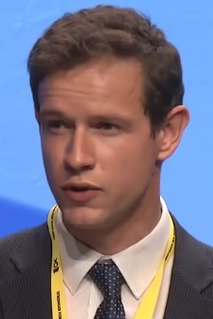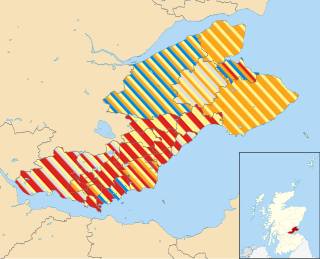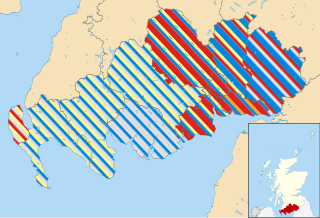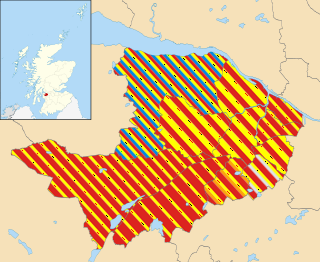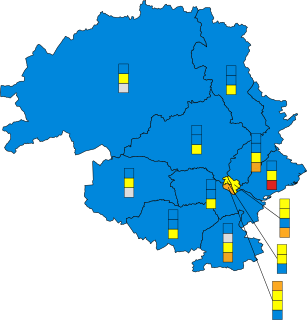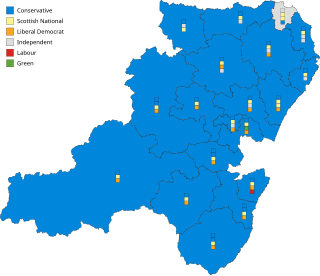This article needs additional citations for verification .(April 2012) (Learn how and when to remove this template message) |
| |||||||||||||||||||||||||||||||||||||||||||||||||||||||||||||
| |||||||||||||||||||||||||||||||||||||||||||||||||||||||||||||
All 20 seats to East Renfrewshire Council 11 seats needed for a majority | |||||||||||||||||||||||||||||||||||||||||||||||||||||||||||||
|---|---|---|---|---|---|---|---|---|---|---|---|---|---|---|---|---|---|---|---|---|---|---|---|---|---|---|---|---|---|---|---|---|---|---|---|---|---|---|---|---|---|---|---|---|---|---|---|---|---|---|---|---|---|---|---|---|---|---|---|---|---|
| |||||||||||||||||||||||||||||||||||||||||||||||||||||||||||||
The 6 multi-member wards | |||||||||||||||||||||||||||||||||||||||||||||||||||||||||||||
| |||||||||||||||||||||||||||||||||||||||||||||||||||||||||||||
The 2012 East Renfrewshire Council election took place on 3 May 2012 to elect members of East Renfrewshire Council. The election used the six wards created as a result of the Local Governance (Scotland) Act 2004, with each ward electing three or four Councillors using the single transferable vote system a form of proportional representation, with 20 Councillors being elected.

The Local Governance (Scotland) Act 2004 is an Act of the Scottish Parliament which provided, amongst other things, for the election of councillors to the local authorities in Scotland by the single transferable vote system.
The single transferable vote (STV) is a voting system designed to achieve proportional representation through ranked voting in multi-seat organizations or constituencies. Under STV, an elector (voter) has a single vote that is initially allocated to their most preferred candidate. Votes are totalled and a quota derived. If their candidate achieves quota, he/she is elected and in some STV systems any surplus vote is transferred to other candidates in proportion to the voters' stated preferences. If more candidates than seats remain, the bottom candidate is eliminated with his/her votes being transferred to other candidates as determined by the voters' stated preferences. These elections and eliminations, and vote transfers if applicable, continue until there are only as many candidates as there are unfilled seats. The specific method of transferring votes varies in different systems.
Proportional representation (PR) characterizes electoral systems in which divisions in an electorate are reflected proportionately in the elected body. If n% of the electorate support a particular political party, then roughly n% of seats will be won by that party. The essence of such systems is that all votes contribute to the result - not just a plurality, or a bare majority. The most prevalent forms of proportional representation all require the use of multiple-member voting districts, as it is not possible to fill a single seat in a proportional manner. In fact, the implementations of PR that achieve the highest levels of proportionality tend to include districts with large numbers of seats.
Contents
- Election result
- Ward results
- Neilston, Uplawmoor and Newton Mearns North
- Barrhead
- Giffnock and Thornliebank
- Netherlee, Stamperland and Williamwood
- Newton Mearns South
- Busby, Clarkston and Eaglesham
- Post-Election Changes
- References
The election saw Labour gain 1 seat while also increasing their vote share. The Scottish Conservative and Unionist Party lost 1 seat and saw their vote share fall as they now become the second largest party on the Council. The Scottish National Party gained 1 seat to increase their numbers to 4 and remained the third largest party. Independents retained their 2 seats while the Scottish Liberal Democrats were wiped out again losing their single seat on the authority.
The Scottish Labour Party is the devolved Scottish section of the UK Labour Party.
The Scottish National Party is a Scottish nationalist and social-democratic political party in Scotland. The SNP supports and campaigns for Scottish independence. It is the second-largest political party by membership in the United Kingdom, behind the Labour Party and ahead of the Conservative Party, it is the third-largest by overall representation in the House of Commons, behind the Conservative Party and the Labour Party, and it is the largest political party in Scotland, where it has the most seats in the Scottish Parliament and 35 out of the 59 Scottish seats in the House of Commons of the Parliament of the United Kingdom. The current Scottish National Party leader, Nicola Sturgeon, has served as First Minister of Scotland since November 2014.
The Scottish Liberal Democrats is a liberal and social-liberal political party in Scotland.
Following the election the Labour Party formed a Coalition with SNP and the Independent Danny Devlin. This was in effect a continuation of the previous Labour - SNP - Independent - Lib Dem coalition administration which had existed before 2012.





